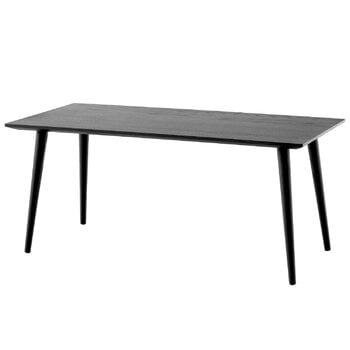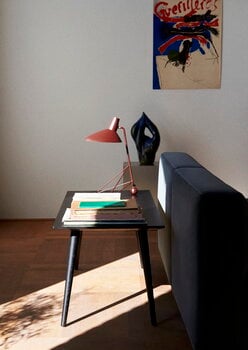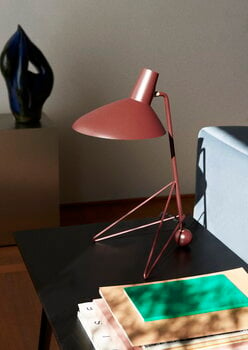&Tradition’s In Between coffee table is an elegant addition to the wooden furniture collection designed by Sami Kallio. Launched in 2021, the In Between SK23 table echoes the clear shapes and sloping legs of the In Between chairs. A result of designer Kallio’s love for Scandinavian design heritage and woodworking, the In Between coffee table is made of strong and characterful oak wood using traditional techniques. The light, airy design and detachable legs give the table a modern finish and allow it to be transported and stored flat-pack.
In Between SK23 coffee table, black oak
&Tradition
Description
&Tradition’s In Between coffee table is an elegant addition to the wooden furniture collection designed by Sami Kallio. Launched in 2021, the In Between SK23 table echoes the clear shapes and sloping legs of the In Between chairs. A result of designer Kallio’s love for Scandinavian design heritage and woodworking, the In Between coffee table is made of strong and characterful oak wood using traditional techniques. The light, airy design and detachable legs give the table a modern finish and allow it to be transported and stored flat-pack.
Product details (7)
- Colour
- Black lacquered oak
- Length
- 110 cm
- Width
- 50 cm
- Height
- 48 cm
- Material
- Black lacquered solid oak
- Weight
- 11.3 kg
- Notes
- Comes flat-packed.
- Product ID
Designer
Sami Kallio (born 1975 in Helsinki, Finland) lives and works as a freelance designer in Gothenburg, Sweden. Kallio has said that his work combines the melancholy of the Finnish design heritage with the humour of the Swedish tradition. He graduated from the School of Design and Crafts in Gothenburg in 2005. Kallio has taken part in numerous exhibitions, and the furniture collection called The Finnish Blood In Me that was presented in Stockholm Furniture fair in 2011 caught a lot of attention.
View all productsReviews (1)
5
Based on 1 reviews
-
A
anonyymi
Helsinki, Finland
Siisti, sellainen kun pitikin olla.
386 days ago
Sustainability
The Product Sustainability Framework, our criteria of sustainable design, helps you find the most sustainable products in our selection. Read below which sustainability criteria this product has met.
Working conditions & labour 8/9
-
Equal opportunities for all employees
-
Commitment to UN Global Compact, fair compensation for all employees
-
Corporate responsibility requirements defined and communicated for suppliers
-
Systematic work for improved inclusion and well-being in the workplace
-
Transparent supply chain
-
Suppliers' compliance to a code of conduct ensured
-
Direct suppliers audited and certified
-
Compliance to the UN Guiding Principles on Business and Human Rights ensured in the supply chain
-
Support for community involvement in the supply chain
Eco-friendly production 6/9
-
Fair and resource-wise water-use in production
-
No incineration or landfilling of returned items
-
No use of endangered species as materials
-
No direct environmental emissions or waste (excl. GHGs) from production
-
Material-efficient and ecological packaging
-
No potentially harmful chemicals used in own production
-
The sustainability of direct suppliers' production is addressed and monitored
-
Production and material sourcing that respect biodiversity, animal rights, and natural ecosystems
-
Positive impact on nature’s well-being through operations that regenerate natural ecosystems
Climate impact 5/8
-
Company's direct greenhouse gas emissions identified and commitment to reduction
-
Product's carbon impact identified and commitment to reduction
-
Guidance on energy- and eco-efficient use of the product
-
Contribution to climate initiatives beyond the brand’s direct operations
-
100 % renewable energy in own production and operations
-
Low-carbon or compensated transportation
-
Carbon footprint of the product calculated and goals set to reduce it
-
Carbon neutral or carbon negative product
Sustainable materials 4/6
-
Sustainable and long-lasting material choices
-
No harmful or hazardous substances
-
Responsible raw material sourcing and production
-
Ecological materials: natural, biodegradable, recyclable or recycled contents
-
Materials suited for circularity: monomaterials, recyclable finishings, renewable or recycled contents etc.
-
Outstanding materials in terms of innovativeness, responsibility, sustainability and circularity: local production or sourcing, 100 % recycled content, C2C-certification etc.
Circular design 4/5
-
High aesthetic quality promoting long-term use of the product
-
Technically durable product design and material choices
-
Design for enduring life-long quality
-
Design and support for product maintenance, repair and upgradability
-
Innovative circular design solutions: circular service system, resale platform, remanufacturing, collection of used products, etc.










